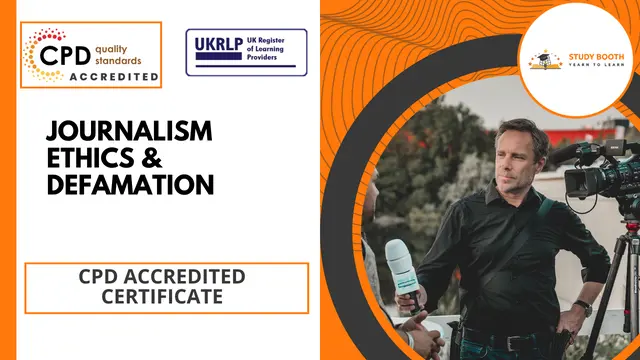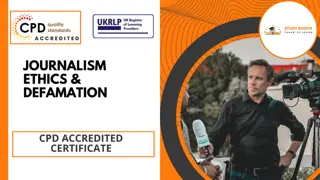
Journalism Ethics & Defamation
Advanced Learning Materials | Certificate Accredited by CPD | Lifetime Access | 24/7 Expert Tutor Support
Study Booth
Summary
- Digital certificate - £4.99
- Hard copy certificate - £9.99
- Exam(s) / assessment(s) is included in price
- Tutor is available to students
Add to basket or enquire
Overview
Picture this: you're a journalist, and you've just published a story that you're really proud of. But then, you get a call from a lawyer. The lawyer says that the story has defamed their client, and they're threatening to sue you.
The problem with journalism ethics and defamation law is that they're complex and ever-changing. What was considered ethical or legal a few years ago may not be the case today. That's why it's so important for journalists to stay up-to-date on the latest developments in these areas. That's where our course Journalism Ethics & Defamation comes in.
Learning Outcomes:
- Gain a thorough understanding of the principles and practices of journalism.
- Explore the historical development of journalism and its impact on the media landscape.
- Master the art of interviewing and develop strong communication skills for journalistic purposes.
- Acquire proficiency in news writing, production, and reporting for various media platforms.
- Understand the legal and ethical considerations in journalism, including defamation laws.
- Enhance your writing skills and craft engaging feature stories for different niches.
CPD
Course media
Description
Step into the captivating realm of Journalism Ethics & Defamation as we take you on a transformative journey through the core principles and practices of journalism. This comprehensive course offers a deep dive into the historical development of journalism, equipping you with a solid understanding of its evolution and significance in today's media landscape. From mastering the art of interviewing to honing your news writing and reporting skills, you'll be equipped with the skills and techniques necessary to thrive in the field of journalism.
In the dynamic UK media landscape, learning Journalism Ethics & Defamation is crucial. With a projected 4% industry growth, this course opens doors to lucrative career prospects. Average salaries for UK journalists range from GBP 25,000 to GBP 45,000 per annum.
One of the key highlights of this course is the in-depth exploration of journalism ethics and the legal framework surrounding defamation. You'll gain insights into the ethical considerations journalists face and learn how to navigate the delicate balance between freedom of the press and responsible reporting.
Enrol in our Journalism Ethics & Defamation course today to gain a comprehensive understanding of journalistic principles, ethics, and defamation laws.
Certification
Upon completing the course, you can obtain a certificate titled Journalism. Certificate options include a PDF Certificate at £4.99, a hardcopy for UK- delivery at £9.99, or a hardcopy for international delivery at £14.99.
Who is this course for?
- Aspiring journalists seeking to enter the dynamic world of media.
- Journalism students looking to expand their knowledge and skills.
- Communication professionals interested in enhancing their journalistic capabilities.
- Writers and bloggers aiming to specialise in journalism and news writing.
- Individuals passionate about media ethics and responsible journalism.
Career path
- Journalist: GBP 25,000 - GBP 45,000 per annum
- News Editor: GBP 30,000 - GBP 60,000 per annum
- Investigative Reporter: GBP 28,000 - GBP 50,000 per annum
- Broadcast Journalist: GBP 25,000 - GBP 45,000 per annum
- Freelance Journalist: Variable income based on assignments and experience
Questions and answers
Currently there are no Q&As for this course. Be the first to ask a question.
Certificates
Digital certificate
Digital certificate - £4.99
Hard copy certificate
Hard copy certificate - £9.99
Hardcopy Certificate for International Students: £14.99
For students outside of the United Kingdom, this option ensures delivery of a high-quality, professionally printed certificate to your international address for only £14.99.
Reviews
Currently there are no reviews for this course. Be the first to leave a review.
Legal information
This course is advertised on reed.co.uk by the Course Provider, whose terms and conditions apply. Purchases are made directly from the Course Provider, and as such, content and materials are supplied by the Course Provider directly. Reed is acting as agent and not reseller in relation to this course. Reed's only responsibility is to facilitate your payment for the course. It is your responsibility to review and agree to the Course Provider's terms and conditions and satisfy yourself as to the suitability of the course you intend to purchase. Reed will not have any responsibility for the content of the course and/or associated materials.





